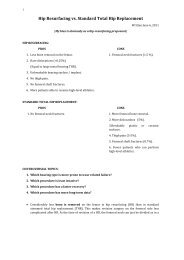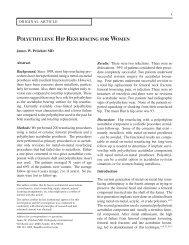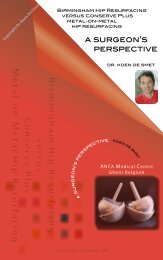Hip and Knee Arthroplasty - Surface Hippy Guide to Hip Resurfacing
Hip and Knee Arthroplasty - Surface Hippy Guide to Hip Resurfacing
Hip and Knee Arthroplasty - Surface Hippy Guide to Hip Resurfacing
Create successful ePaper yourself
Turn your PDF publications into a flip-book with our unique Google optimized e-Paper software.
INTRODUCTION - about the Registry<br />
APPENDIX 3<br />
Patient Information<br />
You are about <strong>to</strong> have a joint replacement. Joint replacement is very successful <strong>and</strong> most people do not<br />
require any further surgery following this procedure. However, a number of people who have a joint<br />
replacement may at some time in the future require another operation on that joint. This may occur due <strong>to</strong><br />
a variety of reasons; the most common being that the joint replacement has worn out. Furthermore,<br />
differences between the many types of artificial joints available may affect the time at which they wear out<br />
<strong>and</strong> require replacing. In order <strong>to</strong> improve the success of this surgery, the Australian Orthopaedic<br />
Association has set up a National Joint Replacement Registry so that joint replacement <strong>and</strong> prostheses can<br />
be moni<strong>to</strong>red.<br />
The purpose of the Registry is <strong>to</strong> assess the performance of all joint replacement. If a joint replacement is<br />
identified as having a problem, the Registry can assist hospitals <strong>to</strong> locate those people who may be<br />
affected. To do this it is important <strong>to</strong> record information on every person having a joint replacement.<br />
Approximately 65,000 people have joint replacement surgery each year in Australia. It is also important <strong>to</strong><br />
record details on any subsequent operations <strong>and</strong> the reason the surgery was performed. By analysing this<br />
information it will be possible <strong>to</strong> identify the cause of any problems as well as determine which types of<br />
joint replacement have the best results. To be successful, the Registry needs <strong>to</strong> gather information on as<br />
many people having joint replacement surgery as possible. We are asking you <strong>to</strong> participate in the<br />
Registry, by allowing us <strong>to</strong> document information relevant <strong>to</strong> your operation.<br />
Your Involvement - the information we need<br />
The information we require includes your name, date of birth, address, Medicare number, hospital identity<br />
number, the name of the hospital <strong>and</strong> the reason you are having a joint replacement. This information is<br />
necessary <strong>to</strong> accurately link you <strong>to</strong> the artificial joint inserted as well as linking any following joint surgery<br />
you may have, <strong>to</strong> your previous records. We will also record the day of the operation, which joint was<br />
operated on <strong>and</strong> the type of artificial joint used. No other personal information is recorded. Hospitals <strong>and</strong><br />
government will send reports <strong>to</strong> the Registry on a regular basis <strong>to</strong> validate the information collected.<br />
Information - how we will keep your information confidential<br />
Your personal information is confidential <strong>and</strong> cannot be used outside the Registry. Procedures are in place<br />
<strong>to</strong> protect your information <strong>and</strong> <strong>to</strong> keep it confidential. When your details have been entered in<strong>to</strong> the<br />
Registry your record will be given a specific Registry number. In addition, you cannot be identified in any<br />
reports produced by the Registry.<br />
How we will collect the information<br />
Although we are asking <strong>to</strong> record your operation details in the Registry you are not required <strong>to</strong> do anything.<br />
Your surgeon <strong>and</strong>/or theatre staff will complete the form that contains your personal details at the time of<br />
your operation <strong>and</strong> send it <strong>to</strong> us. The information will be entered in<strong>to</strong> the Registry computer.<br />
Risks <strong>and</strong> Benefits - <strong>to</strong> you<br />
There are no risks <strong>to</strong> you by having your details in the Registry. Your information is protected <strong>and</strong> we are<br />
not allowed <strong>to</strong> identify you by law. The Registry will produce general reports on a variety of fac<strong>to</strong>rs that<br />
influence the success of joint replacement surgery. This will improve the quality of future joint replacement<br />
surgery.<br />
What <strong>to</strong> do if you don’t want <strong>to</strong> be in the Registry<br />
We underst<strong>and</strong> that not everyone is comfortable about having his or her personal details documented in a<br />
Registry. If you feel this way <strong>and</strong> do not want your details recorded please contact Ms Ann Tomkins,<br />
Coordina<strong>to</strong>r, on 1800 068 419 (freecall). A decision on whether or not you wish <strong>to</strong> be involved in the<br />
Registry does not affect your treatment in any way.<br />
If you have any questions, concerns or require further information on the National Joint Replacement<br />
Registry, please do not hesitate <strong>to</strong> contact Ms Ann Tomkins.<br />
199






